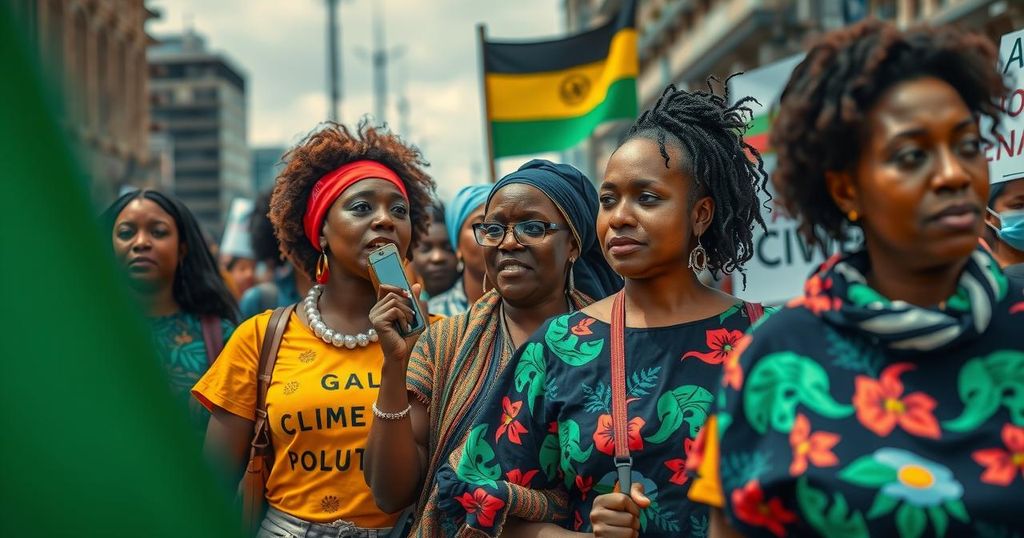Senegalese Women Advocate for Climate Justice Ahead of COP29

Senegalese women marched in Dakar, demanding climate justice and accountability from polluting countries ahead of COP29. The protesters called for a decarbonized future and compensation for the climate impacts faced by communities in Senegal, amidst growing concerns over recent flooding and environmental degradation.
On Saturday, approximately 50 Senegalese women climate activists convened in Dakar, advocating for climate justice as they approach the global stage of the 2024 UN Climate Change Conference (COP29). This march, held annually since 2021, has gained heightened significance this year. The participants vocally condemned “polluting countries” and capitalism, while displaying banners that called for the protection of Senegalese resources and a shift toward a decarbonized future. Cheikh Niange Faye, a former tour guide from Thiès, expressed frustration at the lack of change over the past four years. She highlighted the massive financial investments made by rich countries for conferences despite their responsibility to compensate for climate-related damages. “It’s been four years that we’ve been marching, and nothing’s changed. They’re spending billions to do their conferences, but they owe us billions in compensation,” she stated. This year, Senegal experienced extensive flooding, a plight echoed by many rural women who have witnessed the devastation firsthand. Recent records indicated considerable flooding across the Sahel region, affecting over 1,000 hectares of crops and displacing tens of thousands of people in Senegal. Activists assert that those nations predominantly responsible for greenhouse gas emissions must take accountability for the adverse impacts of climate change on Africa, which contributes only 3.8% of global emissions, according to the Carbon Disclosure Project. Khady Camara, a leading organizer of the women’s climate march in Dakar, appealed for adherence to the Paris Agreement leading into COP29. Khady Faye, an environmental activist from the Saloum Delta, a region severely impacted by coastal erosion, pressed for attention to the plight of afflicted communities, particularly in the context of offshore drilling in the Sangomar oil fields. She urged stakeholders to reconsider their actions and to preserve the homes of vulnerable populations. “Think about the suffering of these communities, think about the suffering of these women,” she urged. In summary, the Senegalese women’s march underscores a growing call for accountability and justice regarding climate change, emphasizing the urgency for developed nations to address their ecological impact, particularly upon the most vulnerable communities in Africa.
This article sheds light on the ongoing climate crisis and the grassroots activism emerging from regions significantly affected by climate change, specifically in Senegal. Despite contributing minimally to global emissions, African nations like Senegal face severe repercussions from climate-related events, such as flooding. The narrative emphasizes the disparity between developed nations, which are responsible for the majority of emissions, and developing countries bearing the consequences. The forthcoming COP29 conference presents an opportunity for dialogue regarding climate justice and accountability.
The march organized by Senegalese women for climate justice highlights the urgent need for developed nations to acknowledge their role in climate change and to provide compensation for the damages experienced by vulnerable populations. This grassroots movement not only seeks recognition but also emphasizes the connection between ecological justice and social equity. As COP29 approaches, the voices of these women resonate as a significant call for action and accountability.
Original Source: abcnews.go.com






